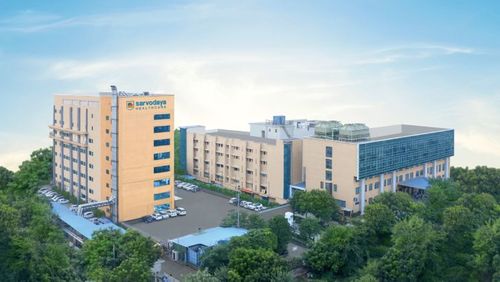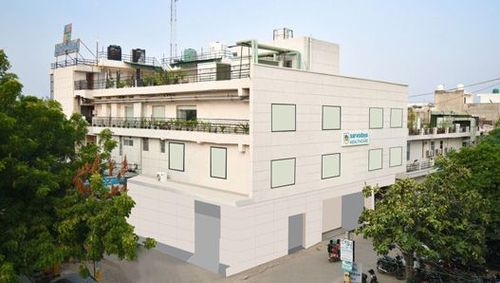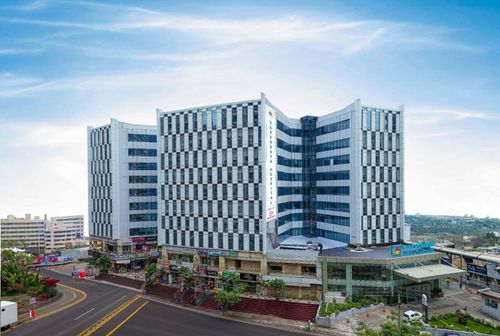Overview
Kidney and bladder stones are hard deposits of minerals and salts that form when concentrated minerals crystallise inside your kidneys or bladder. Large stones that cannot pass naturally or cause bleeding, damage, or ongoing infections require advanced treatment.
At Sarvodaya Hospital, we provide kidney stone laser treatment in Delhi NCR using cutting‑edge procedures like RIRS, MINI PCNL, SUPER PCNL, SUPINE PCNL, and ECIRS with ultra‑advanced technology, including 100 Watt Holmium Laser and Lithotripter.
Our team of experienced urologists performs both conventional and robotic-assisted procedures, combining high-end imaging and surgical precision to remove stones efficiently while preserving kidney function.
Symptoms of Kidney Stones
- Severe, sharp pain in the side and back below the ribs, radiating to the lower abdomen and groin
- Pain or burning sensation while urinating
- Frequent urination or urgency
- Blood in urine (pink, red, or brown)
- Cloudy or foul-smelling urine
- Nausea or vomiting
- Fever and chills if infection is present
- Small stones may pass without symptoms, while larger stones cause significant discomfort
Causes of Kidney Stones
- Dehydration and concentrated urine
- Metabolic and dietary factors
- Genetic and medical conditions
- Medications and supplements
Diagnosis of Kidney Stones
Accurate diagnosis of kidney stones determines size, location, composition, and underlying causes, guiding effective treatment and preventing recurrence, ensuring patients receive expert care from the kidney stone laser treatment hospital in Delhi NCR.- Clinical history and physical examination – Assess pain patterns, urinary symptoms, and risk factors to inform further testing.
- Imaging studies – Non-contrast CT scan (preferred), ultrasound, or KUB X‑ray identify stone size, number, and location for precise management.
- Urine tests – Detect blood, bacteria, and stone-forming substances to guide preventive strategies.
- Blood tests – Evaluate kidney function and metabolic causes contributing to stone formation.
- Stone analysis – After passage or removal, composition is analysed to tailor dietary and medical prevention.
- Multidisciplinary care – Urologists, nephrologists, and dietitians collaborate to provide personalised treatment and long-term kidney stone prevention.
Treatment of Kidney Stones
- Conservative Management – For small stones, increased fluid intake, pain control, and medical expulsive therapy help facilitate natural passage while minimising discomfort.
- Kidney Stone Laser Treatment – RIRS (Retrograde Intrarenal Surgery) uses flexible ureteroscopy with laser fragmentation for precise and minimally invasive removal.
- PCNL Procedures – MINI, SUPER, and SUPINE PCNL are employed for larger stones, offering effective clearance with minimal invasiveness.
- ECIRS (Endoscopic Combined IntraRenal Surgery) – Combines multiple approaches to manage complex or staghorn stones efficiently.
- Robotic-Assisted Stone Surgery – Advanced robotic techniques enhance precision in complex stone removal, improving outcomes and reducing recovery time for difficult cases.
- ESWL (Extracorporeal Shock Wave Lithotripsy) – Non-invasive option suitable for select stone types and locations, breaking stones into passable fragments.
- Open Surgery – Reserved for very complex stones or cases where minimally invasive techniques fail, ensuring complete stone clearance.
Prevention & Lifestyle Modification
At Sarvodaya Hospital, we guide you at every step, empowering you with the right habits to prevent kidney stones and maintain lifelong urinary tract health with care from the best nephrologist in Greater Noida.- Stay well hydrated – Drink 2–3 litres of water daily to dilute urine, reduce mineral crystallisation, and lower stone formation risk.
- Follow a balanced diet – Reduce sodium, limit animal protein, include citrus fruits, and moderate oxalate-rich foods to prevent stone recurrence.
- Maintain a healthy weight and stay active – Regular exercise and balanced nutrition support metabolism and overall kidney health.
- Moderate supplements – Take calcium only if medically necessary, avoid excessive vitamin C, and limit cola intake.
- Manage underlying conditions – Follow medical advice for diabetes, urinary tract disorders, or other conditions that increase stone risk.
- Regular monitoring – Schedule check-ups at a trusted kidney stone treatment hospital to detect and prevent recurrence early.
Pre–Post Kidney Stone Treatment Care
Before treatment
- Comprehensive evaluation, including imaging, blood work, and urine analysis, to determine optimal treatment approach
- Medical optimisation: control pain, treat infections, and manage underlying conditions
- Hydration protocols and dietary counselling to prepare for the procedure
- Discussion of treatment options, expected outcomes, and potential complications with clear informed consent.
After treatment
- Pain management protocols with appropriate medications and supportive care
- Hydration maintenance and dietary guidance to prevent recurrence
- Follow‑up imaging to confirm complete stone clearance and assess kidney function
- Stone analysis and metabolic evaluation to develop personalised prevention strategies
- Regular monitoring and lifestyle counselling for long‑term stone prevention.









